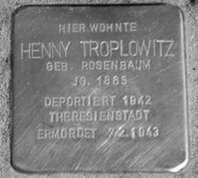Search for Names, Places and Biographies
Already layed Stumbling Stones
Suche
Henny Troplowitz (née Rosenbaum) * 1865
Hölertwiete 6 (Harburg, Harburg)
HIER WOHNTE
HENNY TROPLOWITZ
GEB. ROSENBAUM
JG. 1865
DEPORTIERT 1942
THERESIENSTADT
ERMORDET 7.2.1943
Henny Troplowitz, née Rosenbaum, born 6/3/1865 in Harburg, deported from Leipzig to Theresienstadt 9/20/1942, died there 2/7/1943
Hölertwiete 6 (formerly Ludwigstrasse 14)
Henny Troplowitz, née Rosenbaum, was the third youngest child of the Jewish merchant, real estate and insurance agent Samuel Rosenbaum (11/18/1823 – 3/4/1912) and his wife Johanna, née Aaron, Like her siblings Frida (born 4/1/1859), Meta (born 2/271860, Hermann (born 6/9/1862) and Max (born 3/7/1824) and Paul (born 7/28/1868), she grew up in the emergent industrial town of Harburg on the Elbe. The family had also included her youngest sister Olga (born 7/21/1875), who, to the grief of the whole family, only lived eleven months and was buried at the Jewish cemetery in Harburg, as later her parents were.
The family initially lived in Schlossstrasse, later moved to Mühlenstrasse (now Schlossmühlendamm) and from there to Ludwigstrasse (now Hölertwiete). On August 10th, 1892, Henny Rosenbaum married the Jewish merchant Albert Troplowitz (born November 28th, 1866 in Gleiwitz) in Harburg. He was a relative of the famous chemist and art patron Oscar Troplowitz (1/16/1863 – 4/27/1918), inventor of Nivea Crème and founder of the Beiersdorf company).
The young couple first settled in Riesa in Saxony, where they ran a haberdashery in Hauptstrasse 43 and their daughter Elvira was born on October 16th, 1893. On September 29th, 1895, the family moved to Leipzig, where their son Walter was born on January 27th, 1896. Walter fought as a soldier in World War I and was killed at the front in northern France on July 12th, 1918.
For the Troplowitz’, the world economic crisis of 1919-30 and the appointment of Adolf Hitler as Chancellor of the Reich on January 30th, 1933 marked the beginning of a road that led to disaster. First, they had to helplessly look on as their daughter Elvira and her also Jewish husband Max Holländer (born 6/24/1880 in Meiningen) got deeper and deeper into financial troubles. In March 1933, they were ruined. Max Holländer’s drugstore was deleted from the Halle company register. The family’s distress worsened when Albert Troplowitz died in Leipzig on March 11th, 1937 and his widow Henny was now confronted with increasing anti-Semitic hostilities and threats on her own.
In June 1938, her son-in-law Max Holländer was arrested and admitted to the Buchenwald concentration camp in the scope of the first great wave of anti-Semitic arrests, rated as "ASR prisoner” (Aktion Arbeitsscheu Reich – "operation work-shy”). Shortly after his discharge in October, he was again arrested and taken to the Buchenwald camp near Weimar; this time, he was only able to achieve his release by signing a declaration committing himself to leave Germany as soon as possible. Poor as a church mouse, he escaped to Shanghai in April 1939, then an international city where no visa was required. Max Holländer died there on February 1st, 1943, aged 63.
His wife Henny, who had stayed in Germany, was ordered to do city cleaning work in Halle shortly after the beginning of World War II. Also, she was forced to move to the building "Harz 48” which the Gestapo had declared a "Jews’ house.” On June 1st, 1942, Henny Troplowitz’ daughter, aged 48, was deported to the Sobibor extermination camp and killed in the gas chamber immediately on arrival two days later.
On December 31st, 1940, Henny Troplowitz, aged 75, was forced to move to the "Jews’ home” in Auenstrasse 14 in Leipzig; On September 20th, 1942, she and 872 persons from Thüringen and western Saxony were deported to the Theresienstadt ghetto. The conditions the deportees encountered on arrival there by far surpassed their worst fears. They were assigned to hopelessly overcrowded quarters where their daily life was determined by famine, disease and death. Henny Troplowitz was among those whose life came to a sad end here. She passed away on February 7th, 1943.
Translated by Peter Hubschmid
Kindly supported by the Hermann Reemtsma Stiftung, Hamburg.
Stand: March 2019
© Klaus Möller
Quellen: Hamburger jüdische Opfer des Nationalsozialismus. Gedenkbuch, Jürgen Sielemann, Paul Flamme (Hrsg.); Hamburg 1995; Harburger Opfer des Nationalsozialismus, Bezirksamt und Bezirksversammlung Harburg (Hrsg.), HH-Harburg 2002; Gedenkbuch. Opfer der Verfolgung der Juden unter der nationalsozialistischen Gewaltherrschaft in Deutschland 1933–1945, Bundesarchiv (Hrsg.), Koblenz 2006; Theresienstädter Gedenkbuch. Die Opfer der Judentransporte aus Deutschland nach Theresienstadt 1942–1945, Prag 2000; Yad Vashem. The Central Database of Shoa Victims´ Names: www.yadvashem.org; Eberhard Kändler/Gil Hüttenmeister, Der jüdische Friedhof Harburg, Hamburg 2004; Journal Juden in Sachsen, Deutsch-Russisches Zentrum (Hrsg.), Leipzig 2012; www.gedenkbuch.halle.de/gbdatensatz; www.zeit-geschichten.de/th_01_v_71.html.


